The way from surgery to game dev or the first experience of mobile development on Unity
Why, to whom and from whom
Hello! My name is Anatoly. I want to tell a story about our first steps in game dev, to share, albeit small, but still experience. What for? Because only 6 months ago he himself was looking for such publications, re-reading and writing out tips. I hope that my post will give novice developers useful information, someone will push for development, and someone, possibly, and vice versa. I do not think that people who are knowledgeable in the topic will find something interesting for themselves, but for beginners or those who want to become them, the article can definitely be useful. I’ll tell you the whole way from the idea to the publication of the finished application on Google Play. In general, let's go!
Caution: Be Vigilant - Longrid! If you do not want to read a lot - an extract from practical tips and links at the end of the article.
Foreword or where it all began
As you already understood from the title of the topic, I am a surgeon by training. I also do quests in reality (horror, which influenced the choice of the game genre). From what was useful to me in the development: basic knowledge of photo editors, sound recording and sound processing, the ability to write scripts for quests, as well as about 2 months of learning Java.
The emergence of ideas
My friend (programmer) and I have been thinking about developing a mobile application for quite some time. The choice was between a program or a game. Throwing over the ideas of the programs, we realized that we can not offer anything conceptually new, so our choice fell on the development of the game. Initially, we took up the idea of a time killer 2D arcade game with pixel graphics. But after writing the dzdock and the first steps in the development, we realized that with such an idea and a game we would definitely not go far, and we would have to invest a lot of energy in it anyway.
Around the same time, I have such a logical chain: the quests for reality originate from games - I can write scripts and open quests in reality - so why not go back to basics and make a mobile horror with puzzles and history?
The argument is “against”: absolutely all books, forums and tips agree on one thing - the first game should be as simple as possible in essence and in development.
Argument “for”: also everyone advises to do what you have at least some experience in.
After a little thought, we decide to make a full-fledged 3D horror. (although, to be honest, they still had no idea what we could do at all)
Development start
Since neither my friend nor I had any experience in game development, we started from the very basics.
Engine selection
Of course, there was no talk of writing your own game engine. Therefore, we began to choose from existing ones. As a result, we decided on Unity, because it is the easiest to learn, is actively developing, provides all the necessary features and, importantly, has a huge lively community, which means it is possible to find answers to almost all of the questions that arise.
Theoretical training
The script was written quite quickly - about a week or two of active work. Minor changes were made to it until the final stages of development.
The study of the engine (and I also C #, which runs Unity work on) we started with books and online articles. Links to the best books we have read will be left below. It took us about 3-4 weeks to complete this stage before we could fully start working on the project.
Naturally, the first thing was to study the niche and choose the references of the games that you should focus on. In our case, these were Granny, Nun, and other similar popular games. It seemed that with their level of elaboration, we could do no worse! What we would like to stand out is a good plot, graphics, attention to details (rather presumptuous for people without gamedev experience, right?) Was it really that simple? Read below :-)
Unity's first steps
As children learn to walk in life, so we began to study Unity by teaching the character how to move and interact with surrounding objects.
Tip: no matter what you start doing in Unity - with a probability of 95% this is already done before you, so carefully look for similar solutions already implemented. This will greatly facilitate the development.
Then came the stage of prototyping the level. At this stage, our game looked something like this:

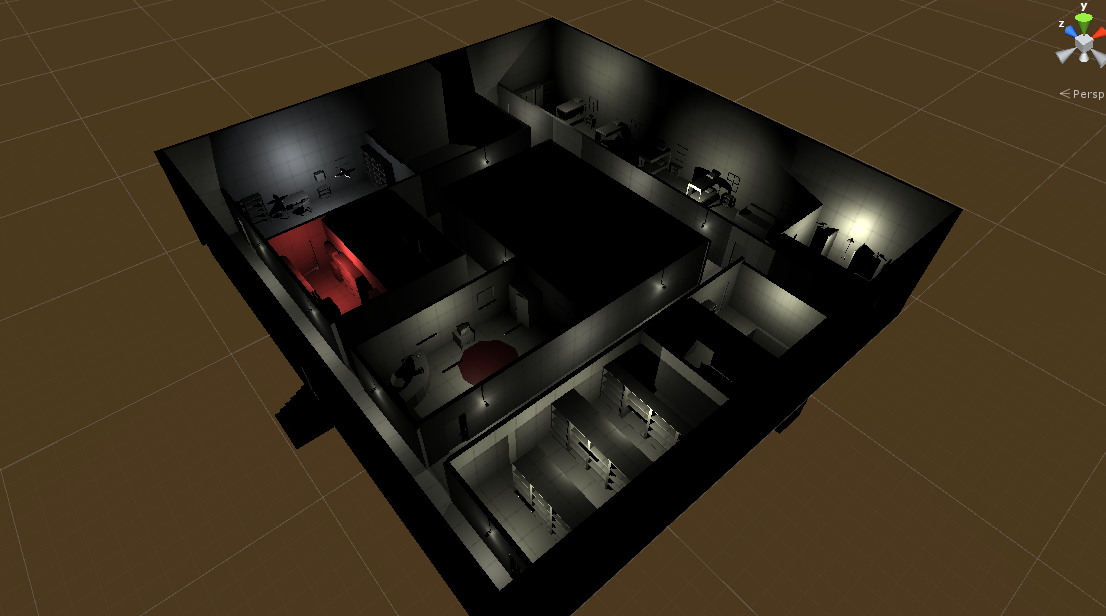
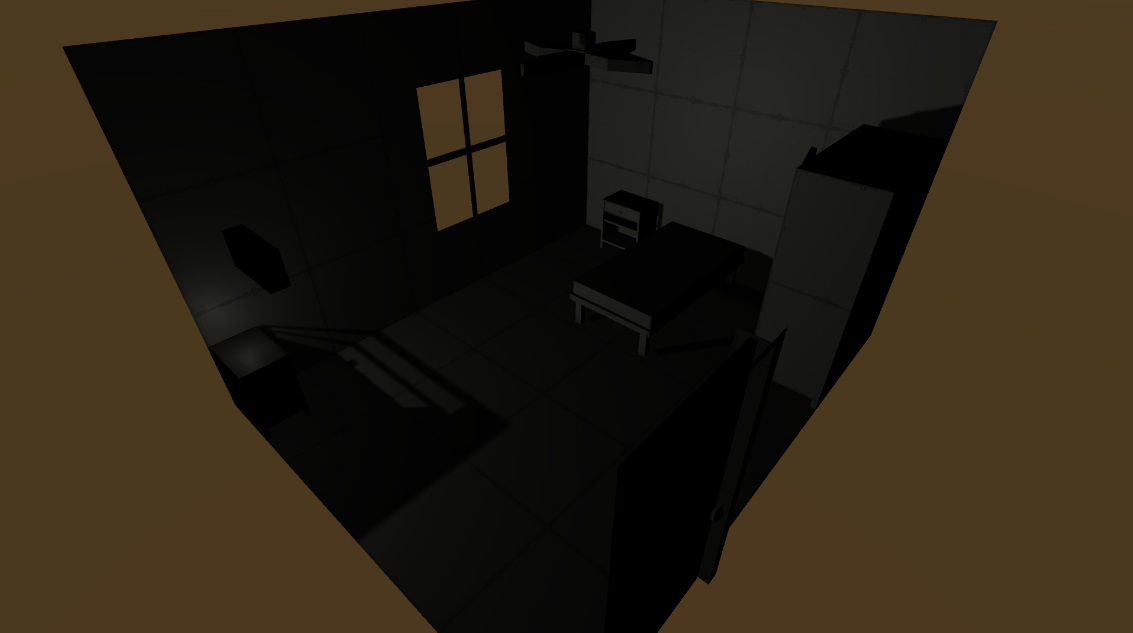
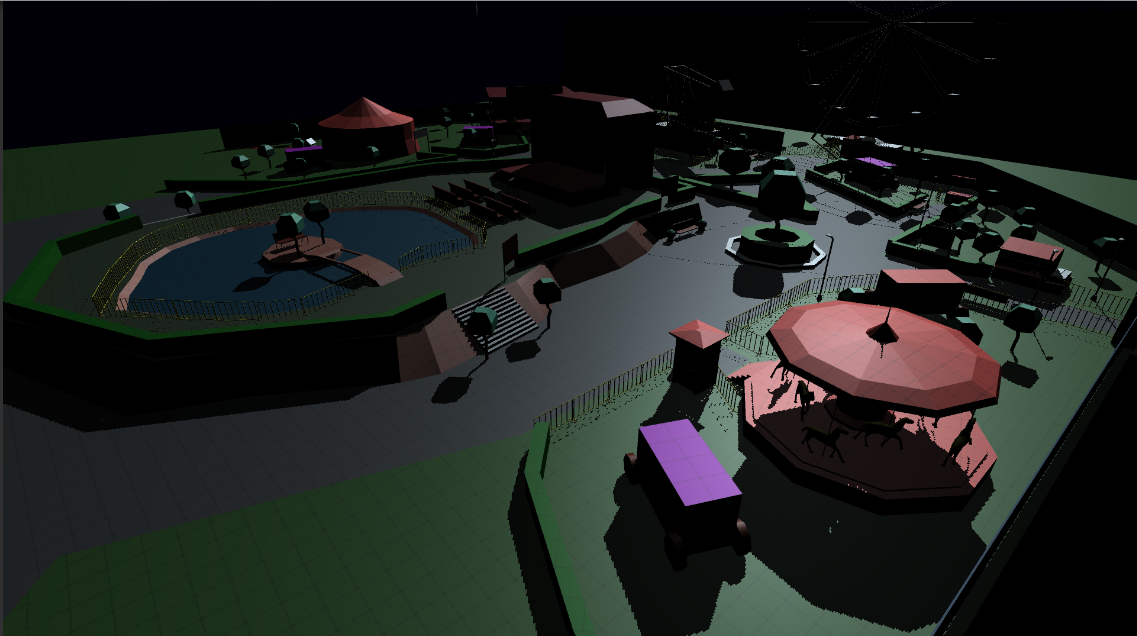
Finally, most of the game mechanics were ready, apart from the main thing - AI. We set up the selection and application of items, inventory, interaction with interactive objects and other little things, which took a very long time, but gave us some confidence in our own abilities. Not really bothering with other complicated things, we decided to do them already in the course of work on the final version.
Work on the final version of the game
We practically did not have experience in 3D modeling, apart from school attempts many years ago, so we had to study it from scratch. Due to the ease of development, flexibility and a large database of video tutorials and tips, we chose Blender for ourselves, which, as it turned out, integrates quite conveniently with Unity, which allows you to flexibly change models during development and roll back changes if necessary. At the same time, models in the project are updated automatically in real time.
Although it was necessary to master the basics of 3D modeling, we still understood that we ourselves could not create a complete set of assets in the desired quality and for the desired time. Fortunately, there were enough ready-made assets in Unity for this topic. As a result, we bought part of the assets, downloaded part for free, and did the rest ourselves. Main
the villain, the evil clown, was ordered on freelance. We had very big doubts that for a limited budget, according to our descriptions and simple sketches, someone would be able to do something more or less adequate.
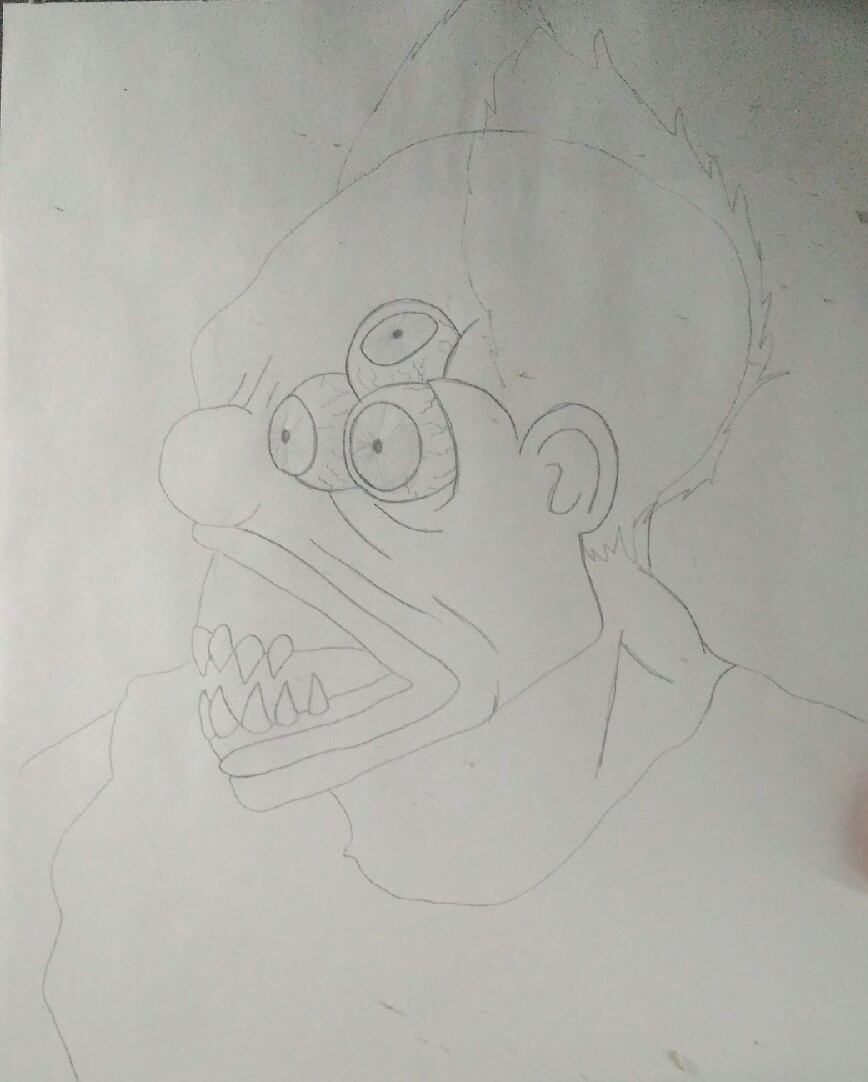
But here we were very lucky with the selected artist and the character turned out to be better than we expected.
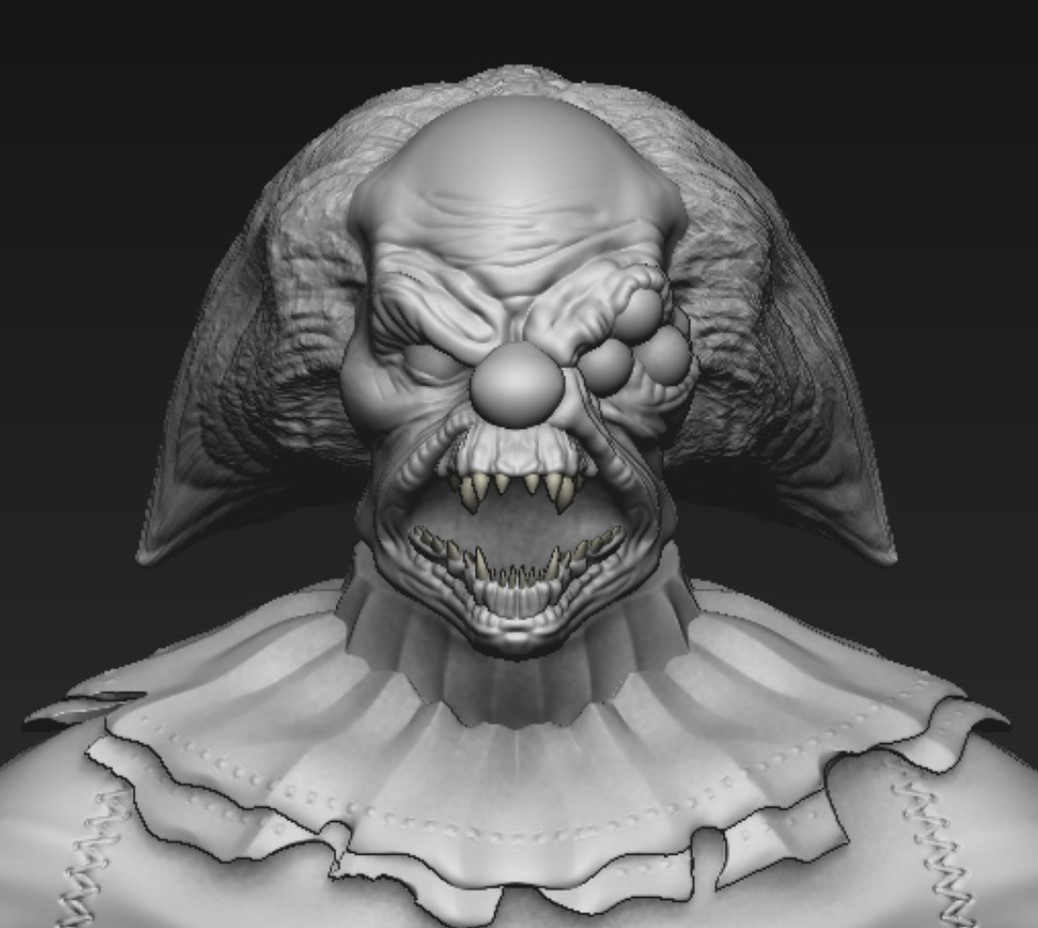

Then came the long months of completing the functionality, a detailed study of Unity, pulling up graphics, writing AI and other little things that make the game a game. And in the end, we came to the next difficulty: publishing the game.
Game publishing
One of the reasons for choosing Unity is cross-platform, which allows one project to be released on all desired platforms (for us, it is Android, iOS, PC). By the time this article was written, the game was released and published only for Android, so add-ons for other platforms will be released later.
Technically, publishing an application on Google Play is easy - everything is intuitive and easy. But there is another side to the issue - your expectations from the publication.
Naturally, we were not sure (and even now not sure) of the prospects of the game, but on a naive mistake, we thought that it was worth publishing the game in the market, as soon as we were promoted to the top of the new ones, downloads and reviews would be showered. This was a huge fallacy.
In fact, after publication, absolutely no one (except your friends, perhaps) will download your game, because no one knows about it . Naturally, even at the development stage, we understood that it was necessary to start at least some kind of advertising company, but there simply wasn’t time for this, because it all went to the development itself. As a result, we came to the time of publication with an unknown application, blindly hoping for a quick start.
Reality: the moment of release of the game, this is only half your path to a successful application. Further (and much better - earlier) begins the equally important and difficult part (in which we also did not have the necessary skills, and which we are learning right now) - its promotion and promotion.
Initially, we did everything on our own, and at minimal cost, so we did not think about attracting a publisher for the game. I can’t say whether this is a mistake or luck (knowledgeable people can add in the comments).
Results and plans
As a result of our semi-annual work, we have a ready-made free game with advertising and in-game purchases, released on one platform. At the moment, a few days after publication, we have about 400 downloads; not bad, although very few reviews, as well as a bunch of questions on the promotion and further fate of our first game.


The plans for its release for iOS and PC, but how difficult it is and is achievable at all - so far, we can not judge (we will be glad to comments from knowledgeable people). In the future, we plan to supplement the post or write a new one, where we will talk about other platforms and the promotion of the game.
Game Dev Amateur Tips
- Start with a theoretical background, but don't spend too much time on it. Experience is gained with practice.
- Use your strengths to the maximum: if you already know something, use it.
- Choose popular reference games and think what you could do better in them.
- Start with a detailed study of the concept of the game, give it to the court for your friends and acquaintances.
- Write a sufficiently detailed dzdok with a description of all the subtleties and details of the game, so that during development any questions about the game can be clarified in it.
- Choose a game engine for your strengths and tasks.
- Do not be afraid to resort to the services of freelancers, but carefully approach their choice.
- Start testing the application on disinterested people as soon as you have the first prototypes. This will allow you to make changes in a timely manner, without cutting the entire game.
- Start an advertising campaign as early as possible: create social networks, a website, start recruiting an interested audience - all this will give you a good boost at the start.
- Do not rely on a quick start and thousands of downloads. Unfortunately, this simply will not happen. The climb to the top will be very long and thorny (especially if you do not follow the previous paragraph).
- Well, it’s commonplace: don’t give up, believe in yourself and work hard so that you yourself like the product you create.
Conclusion
If you have read the article to the end, then thank you!) We hope that you will learn at least a few useful things from it. If I made a mistake somewhere and was wrong - I will be glad to make corrections and wishes in the comments.
We are also ready to answer any questions on the topic and share everything that they themselves have learned at this point.
If you are interested in the result of our work - a link to the game is below.
We welcome your comments, suggestions and suggestions here and on Google Play. Thanks again and good luck!
References and recommendations
The Unity and C # books we started with:
Unity and C #. Gamedev from idea to implementation
Unity for the developer. Mobile multi-platform games
Unity in action. Cross-platform development in C #
Our game on Google Play:
Death park
All Articles